Improving health outcomes for First Nations peoples
On the back of signing the National Scheme’s Statement of Intent in 2018, we have continued our reconciliation journey and strengthened our commitment to deliver a culturally safe workforce.
Over 2020-2021 we’ve focussed on new perspectives, governance and adapting curriculum frameworks.
Our role is to ensure that the public is protected by safe and accountable pharmacists. But it is more than public safety – more than ‘do no harm‘. Our work has to also be socially accountable – that is to ‘do good as well’. We view this as our responsibility, as a standard-setting body, to implement initiatives in pharmacy education that will improve health outcomes for First Nations peoples.
Ahpra states,
Cultural safety is determined by Aboriginal and Torres Strait Islander individuals, families and communities. Culturally safe practice is the ongoing critical reflection of health practitioner knowledge, skills, attitudes, practising behaviours and power differentials in delivering safe, accessible and responsive healthcare free of racism.
Embedding cultural safety in pharmacy education and assessments project
Over 2020 and 2021 we conducted a systemic literature review to evaluate approaches to cultural safety training for health professionals in Canada, Australia, New Zealand and the USA.
Our objective is to enhance cultural safety education of Australian pharmacy students, so that upon graduation they are both:
- committed to the improvement of the health and wellbeing of First Nations peoples
- capable of practising in ways that are culturally safe, sensitive and responsive.
This literature review lays the foundations of a much larger project. To further this pivotal work, we will be initiating complementary activities led by our Indigenous Health Strategy Group (IHSG). We will host a 4-part series to:
- discuss the findings of the literature review
- provide pharmacy education providers and organisations opportunity to share their work in this space
- share where we go from here
Importantly, we will then begin developing our strategy to embed cultural safety into pharmacy curriculum.
Dr Erica Sainsbury, pharmacist and APC consultant, was the author of the literature review. This project has been partially funded by the Pharmacy Board of Australia. Together, we look forward to progressing this initiative.
APC welcomed new perspectives and improvements for Indigenous Health Strategy
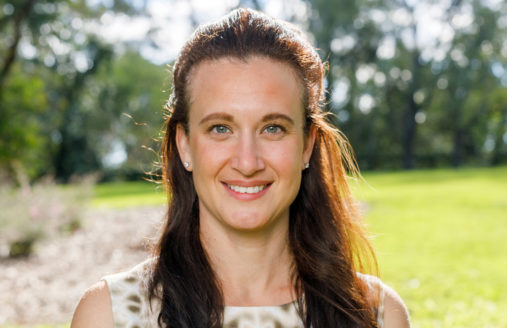
We welcomed Ms Chastina Heck a Nywaigi, Mamu, Bidjara woman and hospital pharmacist to our IHSG.
Chastina remains connected to communities in both rural and urban settings and has said she is ‘passionate about sharing her stories of knowing, being and doing pharmacy and healthcare business especially in regard to the health and wellbeing of Australia’s First Peoples’.
Learn more about Chastina
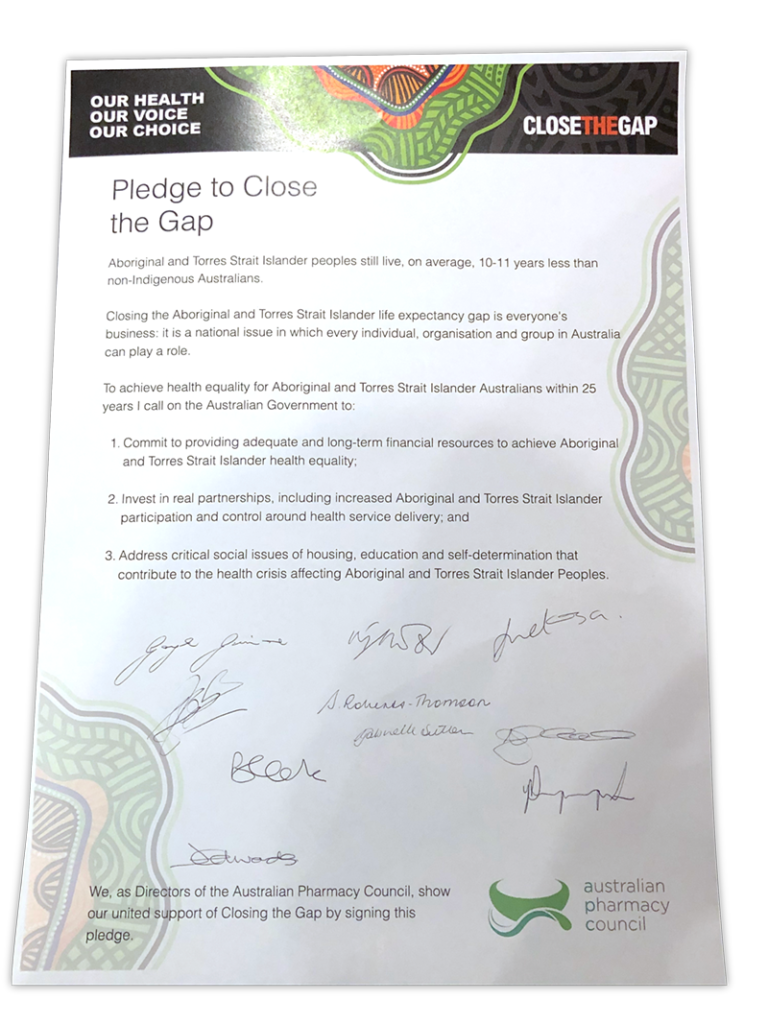
Pledge to Close the Gap
In March 2021, APC Board Directors physically signed a Close the Gap pledge as a symbol of our commitment. They also signed the pledge online.
Our APC Staff then joined Lowitja Institute for the Close The Gap Report Launch.
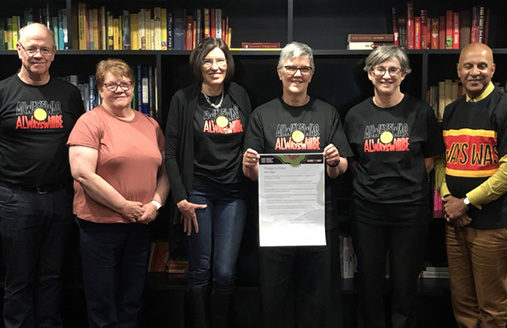
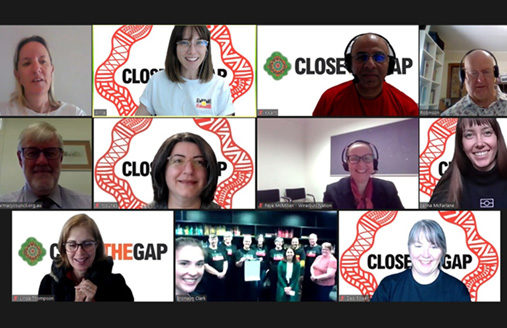
Reflect Reconciliation Action Plan
The Reconciliation Action Plan (RAP) working group have progressed the RAP to it’s final stages. The APC Board has approved the version of the pillars completed on 9 June 2021. We are now ready to submit it to Reconciliation Australia for consideration.
Our pillars include actions and deliverables unique to APC such as embedding cultural safety in programs for education providers. We have had plenty of staff engagement when compiling the content for our pillars.
The pillars of a RAP are 4 concepts provided by Reconciliation Australia:
- Relationships
- Respect
- Opportunities
- Governance
Local contemporary artist, Leah Brideson completed the artwork for the RAP design. Her piece, Always Learning reflects our continual journey of learning. It symbolises unity, growth, development and the continual flow and passing of knowledge.
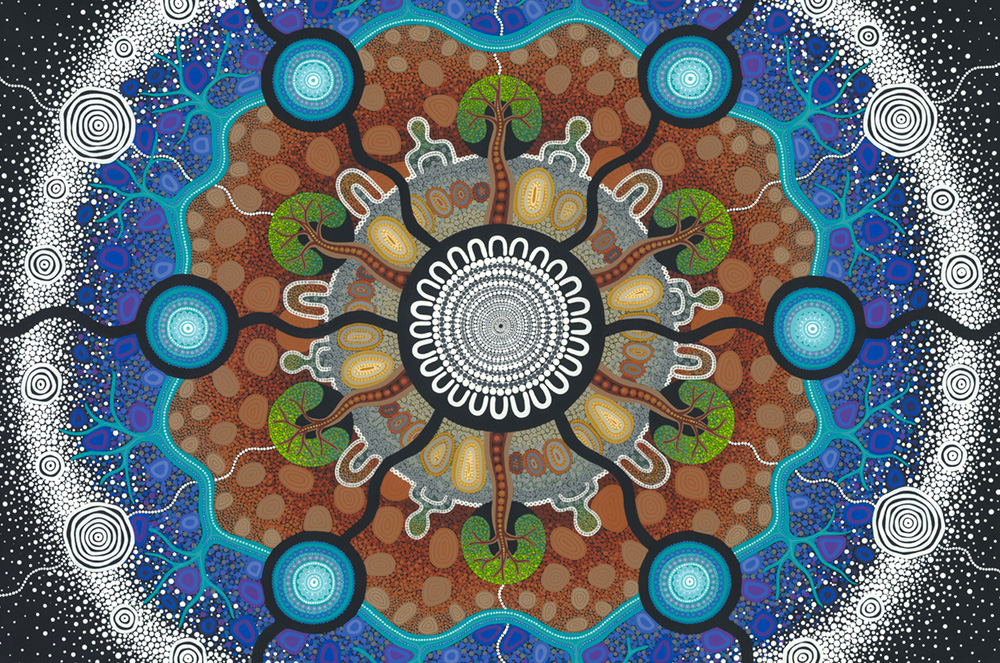
The working group worked on a personalised Acknowledgment of Country, which recognises Aboriginal and Torres Strait Islander peoples as our first pharmacists.
National Reconciliation Week 2020
For 2020 National Reconciliation Week, we watched Puttipari and the Rainmakers. This story about connection to country of birth taught us about the diverse Aboriginal groups, cultures, languages and custodianships of country specific to the Kimberley region.
“This film was incredibly moving. I struggled to hold back tears. Culture and land are such integral parts of their identity. First Australians deserve to be able to learn, practise and teach on their land, without pressures from opposing lifestyles.” – CEO Bronwyn Clark
National Reconciliation week 2021
This year we invited everyone to engage in activities that celebrate culture, promote truth telling and build awareness. This year staff at APC watched a Yarra Ranges Council webinar ‘Our Country, Our Future, Our Shared Responsibility’. To promote the Uluru statement from the Heart we encouraged people to sign support for the First Nations Voice to Parliament.
This year’s theme ‘More than a word. Reconciliation takes action’, encouraged us to transform awareness and knowledge into action. Our vision is to do this through our role as the standard-setting body for pharmacy education.
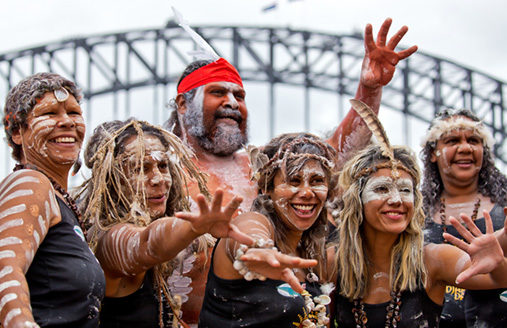
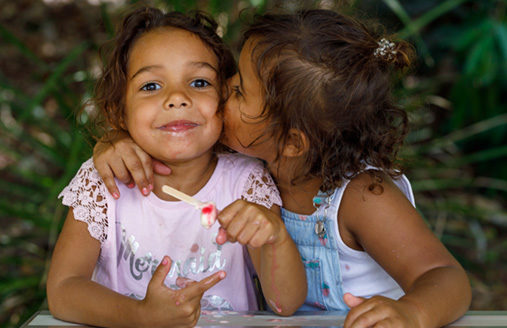
Indigenous Health Strategy Group
We’ve partnered with Aboriginal and Torres Strait Islander and Māori peoples to ensure their voice is leading our work.
The IHSG celebrated their first anniversary and, with that, the opportunity to review their Terms of Reference to ensure an appropriate governance structure is in place into the future.
The group’s advice has also been a vital component of our ongoing project to embed cultural safety in pharmacy education.
“The group’s voice on this matter is absolutely necessary to ensure the best outcomes for future pharmacists and their role in improving health for First Australians. It’s our job to listen.” APC CEO, Bronwyn Clark.
The IHSG was established by the APC Board.
Our high-level objectives are to:
- provide a culturally safe pharmacist workforce for all Indigenous peoples of Australia and New Zealand
- provide a culturally safe pharmacist workforce for all Australians and New Zealanders
- influence and show leadership in the pharmacy sector in achieving health equity
- achieve greater access for Aboriginal and Torres Strait Islander Peoples and Māori to culturally safe services
- achieve increased participation by Aboriginal and Torres Strait Islander and Māori people in the health and education workforce with an overarching aim to achieve parity
- collaborate with others to contribute to the evidence base on the benefits of a culturally safe workforce.
“It is such a privilege to have these esteemed colleagues and wonderful people assist us on this important journey. The indigenous lens that they bring to our work is both important and relevant to all our work, and we thank them so much for their commitment to us.” – Bronwyn Clark, APC CEO.
Please see our Strategic Priorities for further deliverables that we are committed to.
IHSG Members
The IHSG includes the following respected Indigenous leaders:
Associate Professor Faye McMillan
Associate Professor in Aboriginal and Torres Strait Islander health in the School of Population Health
at the University of New South Wales (UNSW)
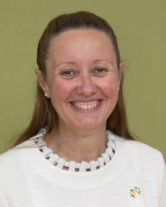
Faye is a Wiradjuri yinaa (woman) from Trangie, NSW. She is a pharmacist with leadership and expertise in education.
This year she has started her new role as one of two new Deputy National Rural Health Commissioners. Here she will play a vital role in the Federal Government’s agenda to increase access to rural health services.
Faye was named the 2019 NSW Aboriginal Woman of the Year. She was the inaugural President of Indigenous Allied Health Australia (IAHA). Faye is also one of our APC Board Directors.
John Briggs
Consultant
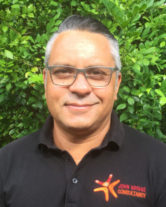
John is a member of the Yorta Yorta and Gunnai nations in south eastern Australia. He brings experience in teaching cultural safety through workshops, presentations and keynote speaking.
He provides expertise, consultancy and solutions around Indigenous engagement and inclusion.
Chastina Heck
Clinical pharmacist, Logan Hospital, Brisbane and Conjoint Associate Lecturer, University of Queensland
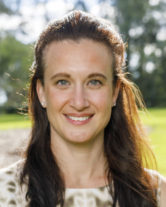
Chastina is a Nywaigi, Mamu, Bidjara woman. She is currently working as a clinical pharmacist at the Logan Hospital in Brisbane and is a Conjoint Associate Lecturer in the School of Pharmacy at the University of Queensland.
She is passionate about sharing her stories of knowing, being and doing pharmacy and healthcare business, especially in regard to the health and wellbeing of Australia’s First Peoples.
Leanne Te Karu
Pharmacist and Pharmacist Prescriber, Auckland New Zealand
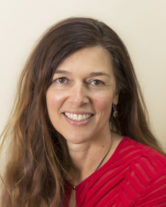
Leanne was born near her ancestral mountain of Ruapehu where she affiliates to her Ngāti Rangi, Te Āti Haunui-a-Pāpārangi side.
As well as providing care as a pharmacist prescriber in her communities, Leanne works part time as Associate Dean Māori at Otago University’s School of Pharmacy. She brings expertise in leadership and experience in practice and education.
Leanne was the inaugural President of Ngā Kaitiaki o Te Puna Rongoā o Aotearoa, the Māori Pharmacists’ Association (MPA) in Aotearoa/New Zealand.
Aleena Williams
Director of Immunisations and Notifiable Diseases at NT Health
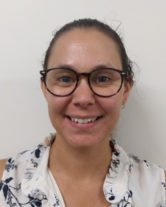
Aleena is a Yugambeh woman from South-East Queensland. She is a registered pharmacist with a background in rural and remote pharmacy practice. Aleena brings a lived experience of working as a pharmacist while maintaining connections to community and country.
Aleena also sits on our RAP Working Group.

